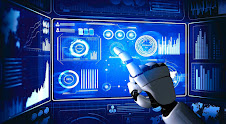Robotics and Automation: Robots Are Increasingly Becoming Smarter and More Versatile in 2024
INTRODUCTION
Envision a reality where robots follow orders as well as adjust, learn, and perform undertakings you never imagined. That world isn't far off—it's happening right now! Robots and automation are evolving rapidly, becoming smarter, more versatile, and a vital part of our daily lives in 2024.
From your morning coffee maker to futuristic robots in factories, automation is redefining how we work and live. How about we jump into how these progressions are forming our reality.
TABLE OF CONTENTS
Sr# Headings
1 What Are Robots and
Automation?
2 Why Are Robots
Becoming Smarter?
3 The Role of AI in
Modern Robotics
4 Versatility of
Robots in Everyday Life
5 How Robots Are
Revolutionizing Industries
6 Robots in
Healthcare: A Game Changer
7 Automation in
Education and Learning
8 Smarter Robots in
Agriculture
9 Automation and Its
Impact on Jobs
10 Robotics in Space
Exploration
11 Ethical
Considerations in Robotics
12 Future Trends in
Robotics and Automation
13 Challenges in
Implementing Advanced Robots
14 How Can You Adapt to
an Automated World?
15 Conclusion: Embracing
the Robotic Future
1. What Are Robots and Automation?
At its center, robots and robotization allude to machines intended to
perform assignments with insignificant human intercession. While automation
focuses on processes, robots often involve physical machines that can interact
with their surroundings. Think of self-driving cars or robotic vacuum
cleaners—they're all part of this fascinating domain!
2. Why Are Robots Becoming Smarter?
Robots are evolving because of advancements in Artificial Intelligence
(AI), sensors, and computing power. In 2024, robots can learn from data, adapt
to new environments, and even make decisions, much like how we humans adjust to
different situations.
3. The Role of AI in Modern Robotics
AI acts like the brain of a robot, helping it to understand and react
to its surroundings. For instance, warehouse robots can now navigate crowded
spaces, identify packages, and even predict maintenance needs. Without AI,
these smart capabilities wouldn't exist.
4. Versatility of Robots in Everyday Life
Have you noticed how robots are sneaking into your daily routine? From
smart home assistants like Alexa to robotic chefs whipping up meals in
restaurants, they’re taking on roles that make our lives easier.
Key Example:
Robots in kitchens can now prepare gourmet dishes, saving chefs hours
of labor. Like having an individual partner won't ever tire!
5. How Robots Are Revolutionizing Industries
Industries like manufacturing, logistics, and retail are being
transformed by robots. Automated systems streamline processes, reduce errors,
and increase efficiency.
Fun Fact:
Some factories now operate 24/7 with robotic systems, producing goods faster than ever before. The cartesian robot is the most regularly utilized modern robot, commonly for CNC machines or 3D printing.
6. Robots in Healthcare: A Game Changer
In 2024, robots are assisting in surgeries, diagnosing diseases, and
providing elderly care. For instance, robotic surgeons offer precision beyond
human capability, leading to quicker recoveries.
7. Automation in Education and Learning
Imagine a classroom where robots act as teaching assistants,
customizing lessons for each student. This isn't science fiction anymore!
Automation in education helps students learn at their own pace while teachers
focus on creativity and problem-solving.
8. Smarter Robots in Agriculture
Farming is no longer just about soil and sweat. Robots now plant,
water, and harvest crops with incredible accuracy, helping farmers grow more
food sustainably.
9. Automation and Its Impact on Jobs
While robots take over repetitive tasks, they also create opportunities
for new roles in robot maintenance, programming, and AI development. Instead of
replacing jobs, automation often transforms them.
10. Robotics in Space Exploration
Did you know robots are exploring Mars and beyond? With their advanced
sensors and AI, space robots handle extreme conditions, paving the way for
human exploration.
11. Ethical Considerations in Robotics
With great power comes great responsibility. Should robots be able to
pursue moral choices? As we give them more control, it’s crucial to address
questions about accountability and fairness.
12. Future Trends in Robotics and Automation
2024 is just the beginning. Expect more human-like robots, smarter
automation in homes, and innovations we can't yet imagine. The future is wide
open!
13. Challenges in Implementing Advanced Robots
Despite the excitement, challenges like high costs, security risks, and
ethical concerns make adopting advanced robotics tricky. Overcoming these
barriers is vital for progress.
14. How Can You Adapt to an Automated World?
Stay curious and learn new skills! By understanding robotics and
automation, you can take advantage of opportunities in this ever-evolving
field.
15. Conclusion: Embracing the Robotic Future
The rise of robots and automation is transforming our world in
incredible ways. Whether it’s making surgeries safer, farming smarter, or our
daily lives easier, robots are here to stay. Instead of fearing this change,
let’s embrace it and prepare for a future filled with endless possibilities.
FAQs
1. What is the main difference between robots and automation?
Automation refers to processes performed without human input, while
robots are physical machines capable of interacting with the world around them.
2. How is AI making robots smarter?
AI enables robots to process data, learn, and make decisions, allowing
them to adapt and perform complex tasks.
3. Will robots take over all jobs in the future?
Not all jobs! Robots handle repetitive tasks, but they also create
opportunities for new roles in technology and robotics development.
4. How are robots used in healthcare?
Robots assist in surgeries, patient care, and diagnostics, improving
precision and efficiency in the medical field.
5. Are there ethical concerns with robots and automation?
Yes, issues like accountability, job displacement, and privacy are
important considerations as robots become more integrated into society.




Comments
Post a Comment